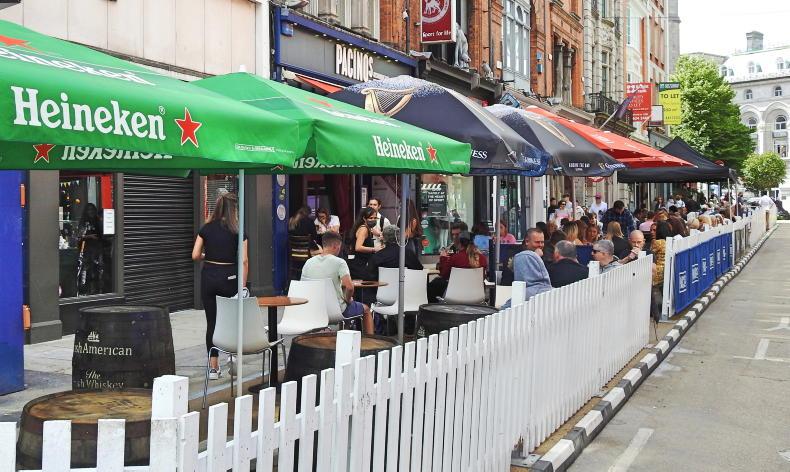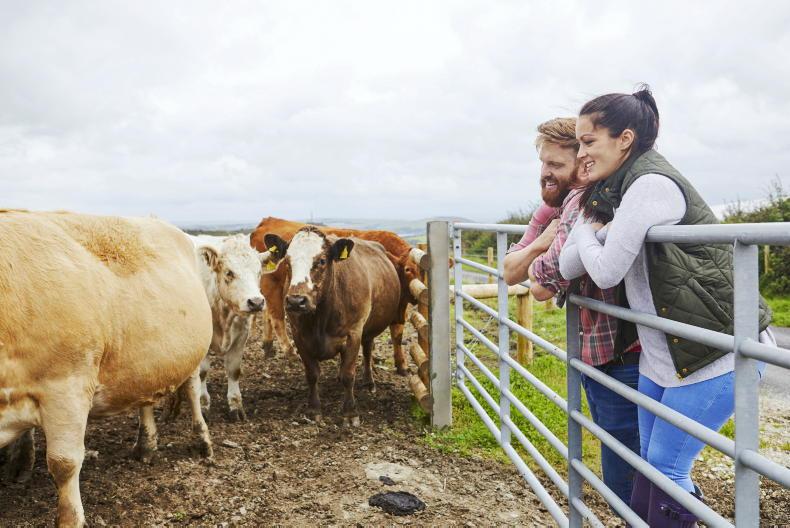COVID-19 has had an effect on all forms of business, whether in agriculture, food, retail or hospitality. With the economy opening up, Irish businesses are looking to recover as quickly and sustainably as possible.
According to Enterprise Ireland (EI), over 60% of Irish businesses were negatively impacted by COVID-19. Financial planning and engaging with their financial institution were seen as key priorities. The comprehensive suite of Government supports for businesses of all sizes, which included grants, low-cost loans, write-off of commercial rates and deferred tax liabilities all helped improve cashflow among many of these impacted businesses. The three main areas of business negatively impacted were identified as sales, staffing and retaining employees and the actual supply chain.
Good news
An Tánaiste and Minister for Enterprise, Trade and Employment Leo Varadkar announced last month that the companies supported by EI have had a net increase in jobs of 11,911 during 2021, with 68% of these new jobs created outside of Dublin. Employment has increased by 9% in the northwest and by 7% in the southeast.
Varadkar confirmed €61.6m of funding was approved for 341 impacted companies in 2021, which is not an insignificant amount.
There were many small businesses and franchises across the country glad of all the Government supports and grants which allowed them to keep their businesses open, such as the pandemic unemployment payment (PUP) or the employment wage subsidy scheme (EWSS).
Franchising and small business
Franchising is all about working for yourself but not by yourself, which would suggest a franchise business might have an advantage over other small businesses during a pandemic.
Aidan McDonnell of Synergy Stocktaking Ireland (SSI) operates an Irish stocktaking business with his brother. It’s a specific auditing system for the hospitality sector, including bars, hotels and nightclubs.
One would expect COVID-19 would have seriously affected their business.
Aidan confirmed the business did experience a big drop in income in 2020 but their income improved in 2021 and the business is nearly back on track for 2022.
He said, had it not been for all the Government supports and grants made available to small businesses, this would not have happened.
He welcomed the fact he had an actual break from the business for the first time in many years due to the first lockdown. He said he took this time as an opportunity to do some development on the business, renovate the offices, do some DIY and spend more time with his family (although he is not a fan of home schooling).
SSI operates a core business of stocktaking but it is also a franchise business with franchisees across the country.
During COVID we may have lost one or two clients but overall we also gained some new ones
As franchising involves the payment of monthly royalties and management fees to the master franchiser from its franchisees, SSI decided to put a hold on these fees for over a year. This did result in a big drop in income for SSI but allowed the retention of their franchisees and team members – which proved a good business decision.
Aidan says: “During COVID we may have lost one or two clients but overall we also gained some new ones.” Although SSI hasn’t sold a franchise in over two years, he feels the appetite or confidence in buying a franchise is really low at the moment.
“People do not wish to invest in any business that depends on the hospitality sector, yet the demand for stocktaking is very high,” he says.
Food business
According to Camilla Grey, owner of Lemongrass Fusion restaurants (Naas and Citywest), and Fletcher’s Pub (Naas), COVID-19 has been quite a challenge.
With regard to her two Asian restaurants, she considers herself lucky in that all her chefs are from Asia, who give an authentic touch to the food, but she needed to evolve and diversify her business as the pandemic escalated.
Although she closed both restaurants for four months in the first lockdown, she has worked tirelessly to continue trading as much as possible since then.
There were many staffing issues mainly due to the high PUP, but she strove to ensure the restaurants remained open. The increased takeaway business (her food offering really suits this), and the loyalty of her customer base, along with some Government supports have kept her going. She was determined to trade and stay open, although her lunchtime trade has not returned yet. She feels this may be due to so many people still working from home.
Camilla took over Fletcher’s Pub in late 2019, so timing was definitely not on her side.
Running a business in hospitality will always have its challenges but during a pandemic so much more so
When allowed to open after the first lockdown, she said the “infamous €9 meal” allowed her to attract new customers as many of the other pub owners in the town did not open at all. The pub had sufficient space for people to eat outside and to be socially distanced.
“Running a business in hospitality will always have its challenges but during a pandemic so much more so. As long as you are prepared to roll up your own sleeves, evolve with it, you can make it work”, she says.
Opportunity in adversity
Irish Country Living also spoke with the owner of Cross Guns Pub, which is in a very rural location 12 miles from Navan. Dermot McDonnell turned a small rural pub into a gastropub.
He converted it to a takeaway food and drink business in the first lockdown, determined to continue to trade. This created a decent turnover for his business with low costs.
Since reopening in 2020, he has completely refurbished the pub (mostly from cashflow and his own personal funds), taken on a business partner and also a new French chef; creating a food experience to equal any gastropub. He has also kept on all of his staff – they availed of the PUP when they could, but preferred to return to work. They did ‘odd jobs’ such as painting and decorating during the renovation period while the pub remained closed. His customers have also continued to support him.
Dermot was very appreciative of the Government grants and initiatives that helped support his business through the pandemic. He believes “there is always opportunity in the face of adversity”.
Read more
Money Mentor: money tips for farming families in 2022
Money Mentor: what to consider when switching mortgage provider
COVID-19 has had an effect on all forms of business, whether in agriculture, food, retail or hospitality. With the economy opening up, Irish businesses are looking to recover as quickly and sustainably as possible.
According to Enterprise Ireland (EI), over 60% of Irish businesses were negatively impacted by COVID-19. Financial planning and engaging with their financial institution were seen as key priorities. The comprehensive suite of Government supports for businesses of all sizes, which included grants, low-cost loans, write-off of commercial rates and deferred tax liabilities all helped improve cashflow among many of these impacted businesses. The three main areas of business negatively impacted were identified as sales, staffing and retaining employees and the actual supply chain.
Good news
An Tánaiste and Minister for Enterprise, Trade and Employment Leo Varadkar announced last month that the companies supported by EI have had a net increase in jobs of 11,911 during 2021, with 68% of these new jobs created outside of Dublin. Employment has increased by 9% in the northwest and by 7% in the southeast.
Varadkar confirmed €61.6m of funding was approved for 341 impacted companies in 2021, which is not an insignificant amount.
There were many small businesses and franchises across the country glad of all the Government supports and grants which allowed them to keep their businesses open, such as the pandemic unemployment payment (PUP) or the employment wage subsidy scheme (EWSS).
Franchising and small business
Franchising is all about working for yourself but not by yourself, which would suggest a franchise business might have an advantage over other small businesses during a pandemic.
Aidan McDonnell of Synergy Stocktaking Ireland (SSI) operates an Irish stocktaking business with his brother. It’s a specific auditing system for the hospitality sector, including bars, hotels and nightclubs.
One would expect COVID-19 would have seriously affected their business.
Aidan confirmed the business did experience a big drop in income in 2020 but their income improved in 2021 and the business is nearly back on track for 2022.
He said, had it not been for all the Government supports and grants made available to small businesses, this would not have happened.
He welcomed the fact he had an actual break from the business for the first time in many years due to the first lockdown. He said he took this time as an opportunity to do some development on the business, renovate the offices, do some DIY and spend more time with his family (although he is not a fan of home schooling).
SSI operates a core business of stocktaking but it is also a franchise business with franchisees across the country.
During COVID we may have lost one or two clients but overall we also gained some new ones
As franchising involves the payment of monthly royalties and management fees to the master franchiser from its franchisees, SSI decided to put a hold on these fees for over a year. This did result in a big drop in income for SSI but allowed the retention of their franchisees and team members – which proved a good business decision.
Aidan says: “During COVID we may have lost one or two clients but overall we also gained some new ones.” Although SSI hasn’t sold a franchise in over two years, he feels the appetite or confidence in buying a franchise is really low at the moment.
“People do not wish to invest in any business that depends on the hospitality sector, yet the demand for stocktaking is very high,” he says.
Food business
According to Camilla Grey, owner of Lemongrass Fusion restaurants (Naas and Citywest), and Fletcher’s Pub (Naas), COVID-19 has been quite a challenge.
With regard to her two Asian restaurants, she considers herself lucky in that all her chefs are from Asia, who give an authentic touch to the food, but she needed to evolve and diversify her business as the pandemic escalated.
Although she closed both restaurants for four months in the first lockdown, she has worked tirelessly to continue trading as much as possible since then.
There were many staffing issues mainly due to the high PUP, but she strove to ensure the restaurants remained open. The increased takeaway business (her food offering really suits this), and the loyalty of her customer base, along with some Government supports have kept her going. She was determined to trade and stay open, although her lunchtime trade has not returned yet. She feels this may be due to so many people still working from home.
Camilla took over Fletcher’s Pub in late 2019, so timing was definitely not on her side.
Running a business in hospitality will always have its challenges but during a pandemic so much more so
When allowed to open after the first lockdown, she said the “infamous €9 meal” allowed her to attract new customers as many of the other pub owners in the town did not open at all. The pub had sufficient space for people to eat outside and to be socially distanced.
“Running a business in hospitality will always have its challenges but during a pandemic so much more so. As long as you are prepared to roll up your own sleeves, evolve with it, you can make it work”, she says.
Opportunity in adversity
Irish Country Living also spoke with the owner of Cross Guns Pub, which is in a very rural location 12 miles from Navan. Dermot McDonnell turned a small rural pub into a gastropub.
He converted it to a takeaway food and drink business in the first lockdown, determined to continue to trade. This created a decent turnover for his business with low costs.
Since reopening in 2020, he has completely refurbished the pub (mostly from cashflow and his own personal funds), taken on a business partner and also a new French chef; creating a food experience to equal any gastropub. He has also kept on all of his staff – they availed of the PUP when they could, but preferred to return to work. They did ‘odd jobs’ such as painting and decorating during the renovation period while the pub remained closed. His customers have also continued to support him.
Dermot was very appreciative of the Government grants and initiatives that helped support his business through the pandemic. He believes “there is always opportunity in the face of adversity”.
Read more
Money Mentor: money tips for farming families in 2022
Money Mentor: what to consider when switching mortgage provider









SHARING OPTIONS